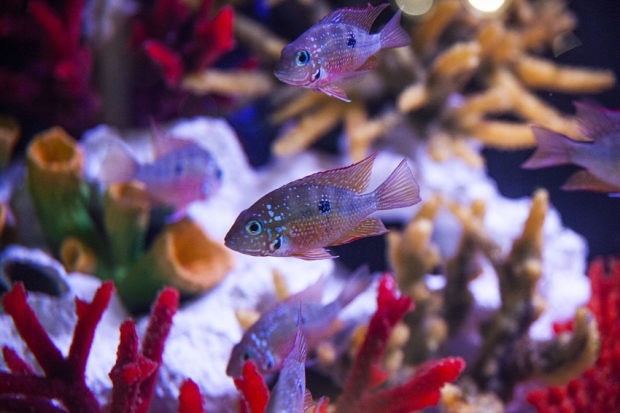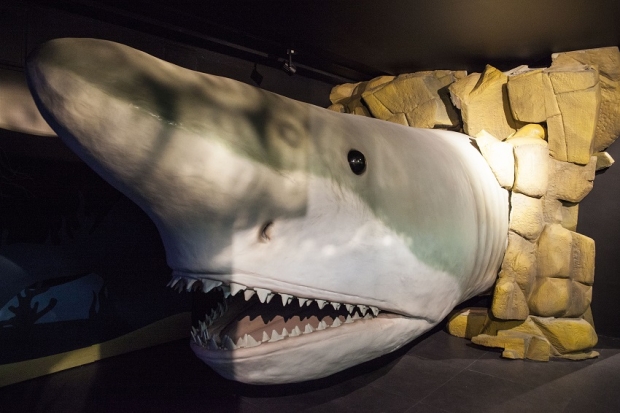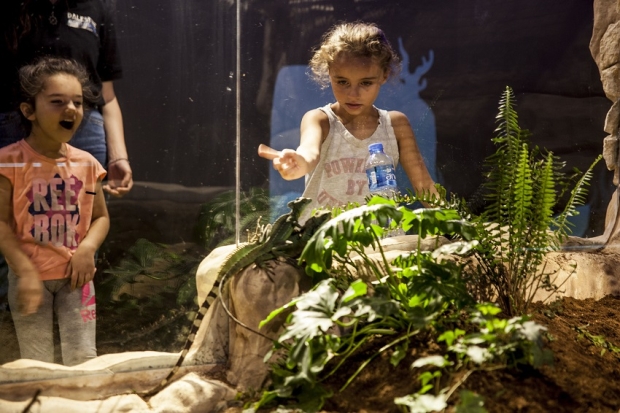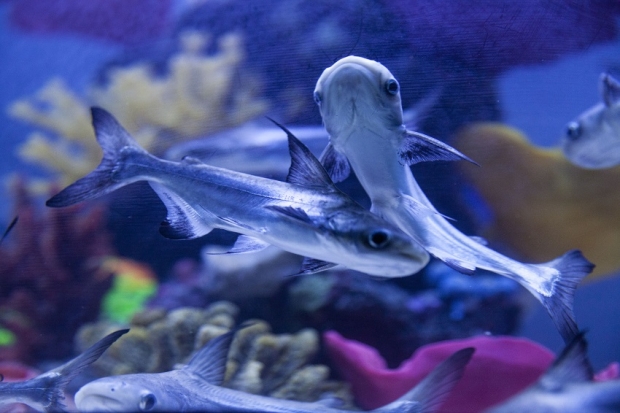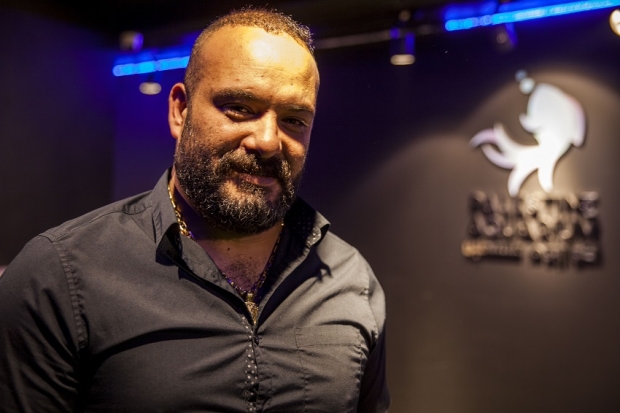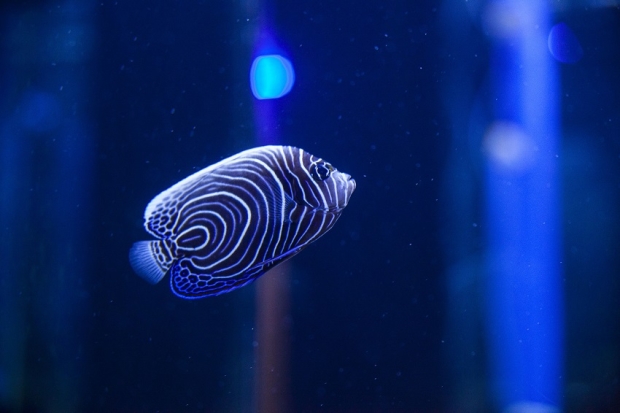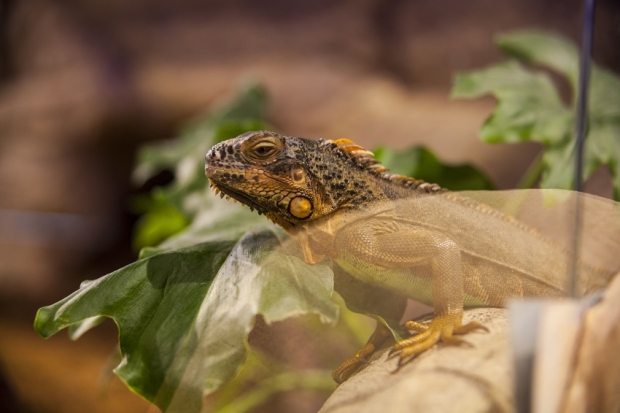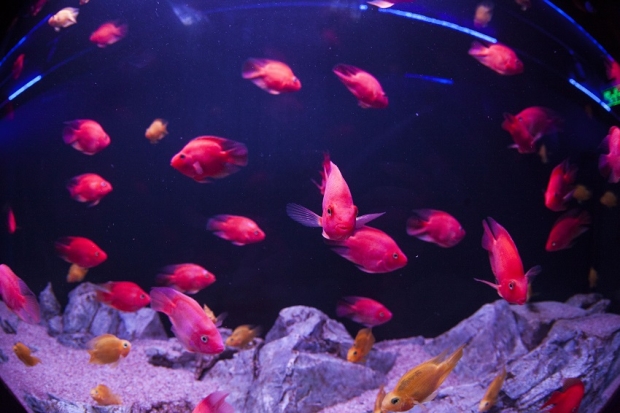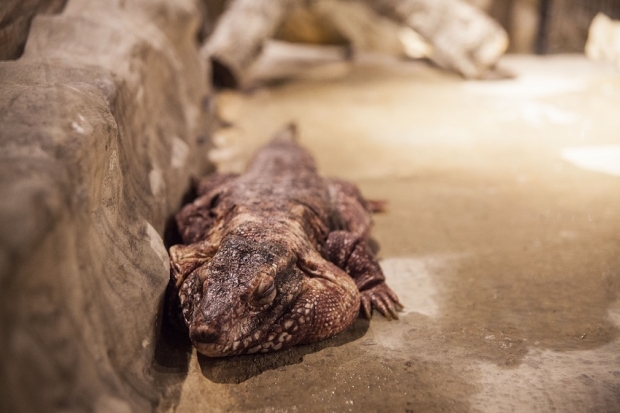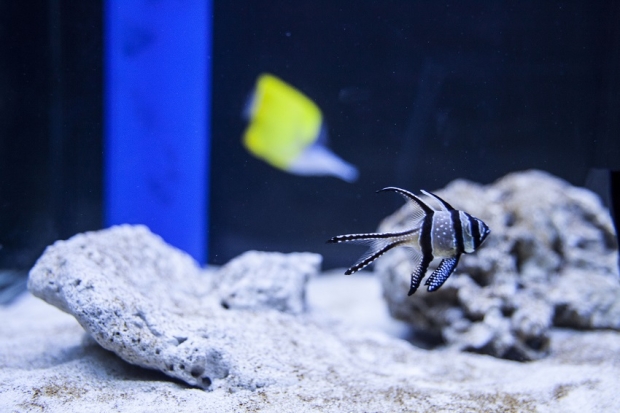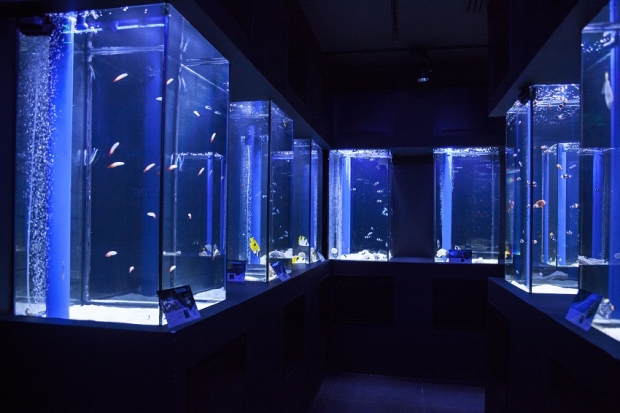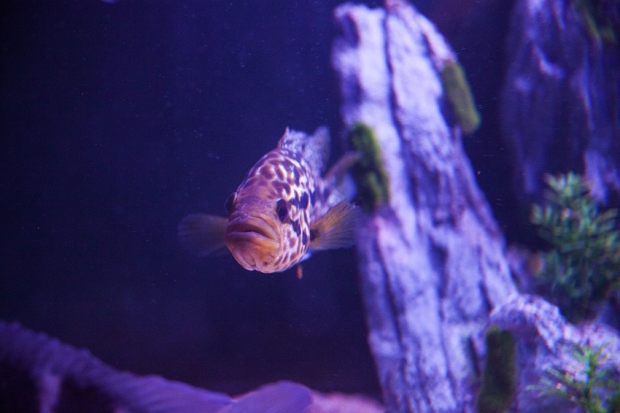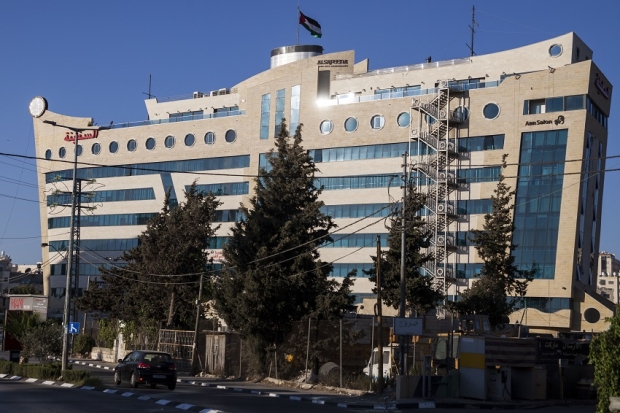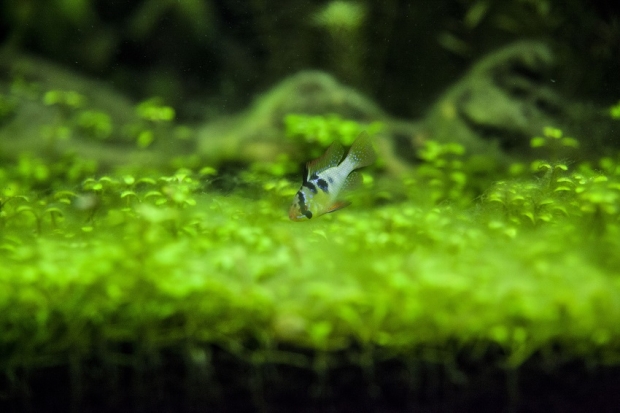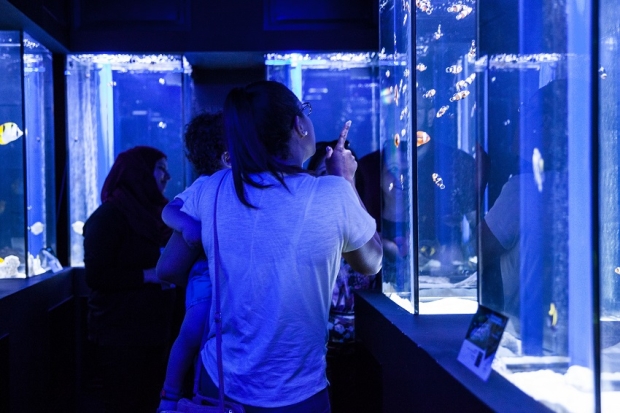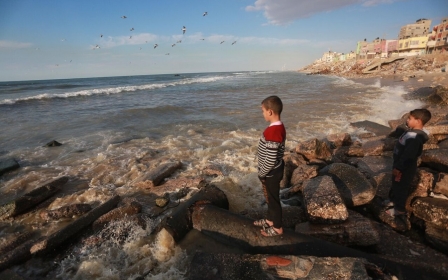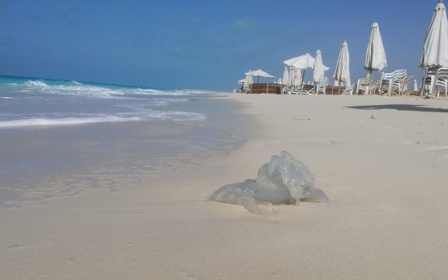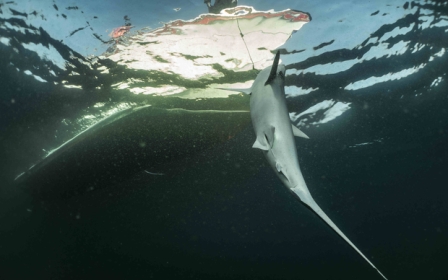Palestine's first aquarium brings marine life to landlocked West Bank
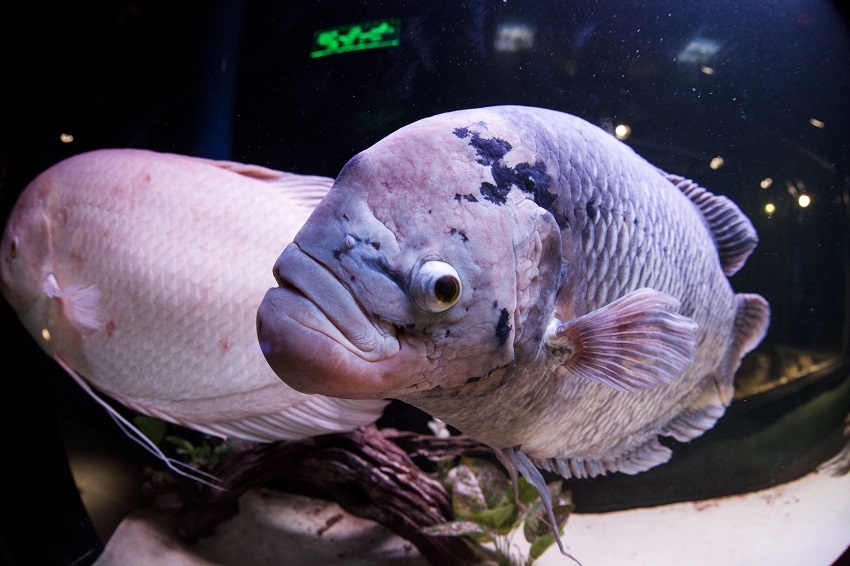
AL-BIREH, West Bank - A giant ship sits staunchly in the city of al-Bireh, next to Ramallah, the de-facto Palestinian capital of the West Bank, its architecture looking out of place against the surrounding block-built apartments and stone houses.
The nautical inspiration also catches the eye for another reasons - the West Bank is landlocked.
Today the ship is host to Palestine’s first aquarium, managed and owned by Sofian Qawasmeh and his business partner Amjad Amer as a new enterprise.
New MEE newsletter: Jerusalem Dispatch
Sign up to get the latest insights and analysis on Israel-Palestine, alongside Turkey Unpacked and other MEE newsletters
Visitors take the elevator to the fifth floor where the aquarium is located, on the way passing hotels and shops. On arrival, the doors open to a long hall, whose walls, floor and ceiling are completely black.
Soon, spotlights descend on the enclosures for alligators and turtles, and while blue lights illuminate the tanks of multi-coloured tropical fish and corals.
Pompous orchestra music plays on a loop as families walk through the maze-like corridors pointing to sea life their young children have likely never seen before in real life.
Schools of fish and creatures of every hue dart across the tanks or sit motionless. Some have come from as far as southeast Asia, including the giant gourami, which builds nests from marine vegetation. An iguana, a lizard native to Central and South America as well as the Caribbean, greets curious visitors with its solemn stare.
Qawasmeh believes everyone should be able to see these types of creatures.
“People here can’t visit our sea, which is occupied by Israel, so we bring it to Palestine so everyone can see it,” he tells MEE.
In 1948, when the state of Israel was created - in what Palestinians refer to as the nakba or "catastrophe" - more than 750,000 Palestinians were forcibly displaced from their homes and villages, leaving Israel to control 78 percent of historical Palestine.
Since the Israeli occupation of the West Bank in 1967 and the building of the separation wall in 2002, many Palestinians with West Bank IDs are not permitted to access Israel or its beaches.
Gaza, which is controlled by Hamas, stretches for 45km on its Mediterranean coastline. But under the Israeli blockade, which has been in place since 2007, residents there can only venture out between six and nine nautical miles (11-17km) from shore. Much of the water within this zone is contaminated by raw sewage.
From Argentina to Palestine
The Palestine Aquarium has more than 150 different kinds of fish, animals and plants in a space of approximately 200 square metres.
Ninety percent of the species are being seen in Palestine for the first time and have been imported from places as diverse as Argentina, the Amazon, Indonesia and South Africa.
The aquarium, according to Qawasmeh, attracts 250-350 visitors a day: tickets cost 20 shekels ($5.40) for children under 10 and 30 shekels ($8) for other visitors.
Juliana Dabes, a recent biology graduate from Birzeit University in the West Bank, works gives tours to visitors when required.
“I took a course in marine life at university, and have a general idea about marine life, but here I can get experience and see what it’s really like,” she says.
Initially scheduled for April, the opening was delayed until July after many of the fish imports were "arbitrarily held" in Israeli ports, according to Qawasmeh.
The animals should have been brought to the aquarium within a maximum of four days, he explains, but instead they were kept at the port from 10 to 20 days. Many were brought in buckets where the animals can only survive for a maximum of six days.
Many of the creatures died or arrived sick at the aquarium due to the waiting time, he says, resulting in a $50,000 financial loss.
Qawasmeh and other Palestinian businessmen say the halting of imports by Israeli authorities is a strategy used to reduce the chances of successful Palestinian businesses, though Israel claims it is in the interest of security (Israel's customs authority did not respond to MEE’s request for comment at time of publication).
Man-made sea water
Delays at the border are not the only problem for Palestine’s first aquarium: access to water for the tanks is also an issue.
“Our aquarium is in a city without any beach, sea or river. It’s the first aquarium in a land without these,” Qawasmeh says.
Instead of taking water from the sea, the Palestine Aquarium makes its own salt water in Saffa, a village near Ramallah.
Flora, a leading Palestinian company which breeds and markets ornamental fish then mixes chemical salts with fresh water from the municipality.
It’s an expensive process that's also symbolic: Palestinians have long faced inequality in access to natural resources under Israeli occupation, including drinking water.
After occupying the West Bank in 1967, Israel controls 80 percent of Palestinian water resources: the average Israeli consumes four times more water per person than their Palestinian counterpart.
The water required for the Palestine Aquarium is more than 15,000 litres, but Qawasmeh says the amount is similar to that required for a private swimming pool.
Qawasmeh explains the aquarium recycles 10 – 20 percent of the water used each week, which helps it remain sustainable.
Qawasmeh laments that most Palestinians have no access to the sea and do not get the opportunity to travel to other countries.
But despite the hefty running cost, Qawasmeh says that the aquarium is worthwhile. “We launched this project because we need it,” he says, “because it will benefit Palestinians.”
“We need to learn about the world under the sea. We need to be able to live like the rest of the world. And even if our land is occupied, we won’t stop trying to make our country the best.”
This article is available in French on Middle East Eye French edition.
Middle East Eye delivers independent and unrivalled coverage and analysis of the Middle East, North Africa and beyond. To learn more about republishing this content and the associated fees, please fill out this form. More about MEE can be found here.


